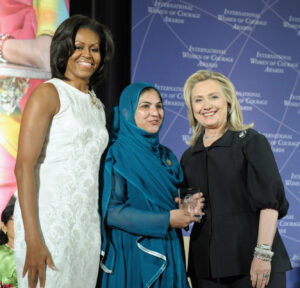Untapped Potential
Shad Begum is a social worker from Dir Lower, Pakistan. She is the first university-educated female in her family and one of the very few Pakistani women supported in her activism by her father, brothers and husband. Shad’s fight for equal rights began more than 20 years ago, when she founded the Association for Behavior and Knowledge Transformation (ABKT).
In 2012, a photo of three outstanding women was widely distributed by the media. In that photo, Shad Begum is standing between Michelle Obama and Hillary Clinton, holding the 2012 International Women of Courage Award in her hands. The same picture is hanging on the wall of her office as evidence of the global recognition of her work in Pakistan.
“I can still feel the vibes when I start thinking about that moment. When I was standing there, I was having some sort of flashback to my work; all challenges I had experienced through my life. I was there, standing between those two renowned women, but it felt like I was in my village where I started my journey.”
Making History
Shad Begum established Association for Behavior and Knowledge Transformation when she was only 16. The ABKT started small, helping women by connecting them with the organizations that provided them with legal and other support. But as time passed, Shad and others realized that a sewing machine or lectures about their rights couldn’t really change the women’s status. An infrastructure was needed to give them tools to stand on their own two feet.
“We made history by recognizing women’s role in politics. We challenged. I ran for elections as an independent candidate in a region where killing a woman was part of the culture and nobody would report the murderer. At the same time, a woman in another town who had run for the city council was killed.”
Shad won the elections; her family had been by her side all the time. Even after winning, it took time for the elected male politicians to let the elected women join them in their ranks, even to sit together in the council room. It took six years for them to realize that all elected figures, regardless of their gender, had the same responsibilities.
“Recently, the law was amended, and now women cannot be easily banned from voting.”
“After constantly working with the elected women, now we have a good presence of them in city councils. Soon, we’ll have the local bodies elections. This time, we’re going to multiply the number of women. We are trying to have a big number of voting women. Recently, the law was amended, and now women cannot be easily banned from voting. Ten percent of women’s vote is needed, otherwise the Election Commission has to declare elections null and void.”
Lower Dir is the only area in all of Pakistan where elections were invalidated twice, after women had challenged the results of elections. Shad Begum and her team did not hesitate to submit a petition in the election commission and stand against the whole system. And they won. Women need to have access to resources, to social and political platforms. This is what Mrs. Begum has been fighting for. She has no doubt that when most policymakers are men, they fail to represent women.
“One of the reasons of all problems is not including 50 percent of population anywhere, completely ignoring their capacities, their talent and potential. Men talk about today, but they don’t think about the future. Women think about future because they have kids. Women think inclusive. That’s my message. I wish one day everyone in this world will realize the importance of engaging women as a key stakeholder to make this world a better place to live. Women’s potential is yet an “untapped” resource.”
Do What You Believe In
During her long journey, Shad Begum has never underestimated the role of the international community in women’s empowerment. In 2012, receiving the International Women of Courage Award gave her more confidence and inspired to do more what she believed in. Shad attended the award ceremony with other brave women, including Leymah Gbowee and Tawakkol Karman, Nobel Laureates. The day Shad received the award, she along with Malala Yousafzai received threats from the Pakistani Taliban, but none were scared to stop their work for the betterment of women and girls. Later that year, the Taliban shot Malala, but she survived.
Shad’s first autobiography, titled In the Circle of Fire, will be published in the end of 2020. It tells her story and highlights her path for thousands of girls and women to keep dreaming and keep working.
“When I see women speaking up for themselves, I see myself being multiplied in many more Shad Begums… The strength is coming from there. Silencing one Shad Begum doesn’t matter now. Nobody can silence the voices of thousands of Shad Begums. When I see that power, I say to myself: “Yes, this is what I live for. This is where courage comes from.”






